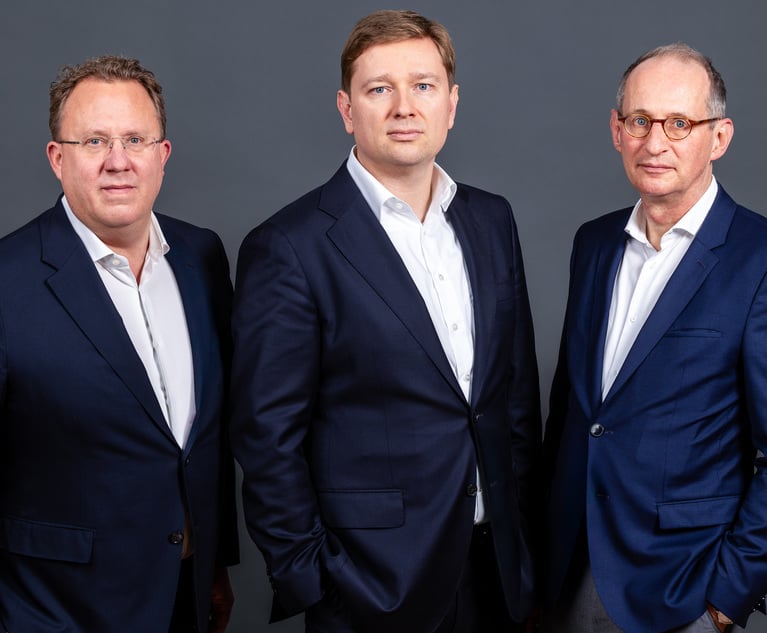The Case for Lateral Partner Due Diligence
Consultant Dan Nardello lays out how law firms can better investigate potential new partners.
June 20, 2017 at 01:46 PM
20 minute read
A law firm's reputation is built on the conduct of its partners. Firms have traditionally promoted from within, a thoughtful and incremental process. Today, however, it has become much more common to recruit partner-level candidates from competitors. Lateral recruiting can drive growth and enhance a firm's reputation, but it can backfire if not done carefully and with thorough vetting. Given the amount of money spent annually by law firms that hire investigators, it is a curious fact that a negligible percentage is spent conducting due diligence on prospective partners.
The reality is many firms hire senior lawyers on little more than a handshake and a personal recommendation. A 2014-15 study by ALM Intelligence found that few law firms maintain formal policies for vetting partner candidates: more than half do not conduct criminal background checks or credit checks, while nearly two-thirds do not check personal references in a comprehensive manner. Such a lax approach to hiring can be costly, as illustrated by a recent episode involving a former partner at Bradley Arant Boult Cummings.
Bradley Arant recently found itself with a big problem when a lateral hire, Walter “Chet” Little, was indicted on insider trading charges. Little, a real estate and finance specialist, moved to Bradley Arant from Foley & Lardner in July 2016. Unbeknownst to his new employer, Little had been fired from his old firm after an internal investigation found he had violated ethics rules by misusing confidential client materials to trade securities. According to the criminal complaint, Little accessed Foley's internal database to obtain material nonpublic information on at least seven publicly listed clients—none of which he represented—information that he and a friend used to make more than $1 million in profits on stock trades.
This content has been archived. It is available through our partners, LexisNexis® and Bloomberg Law.
To view this content, please continue to their sites.
Not a Lexis Subscriber?
Subscribe Now
Not a Bloomberg Law Subscriber?
Subscribe Now
NOT FOR REPRINT
© 2025 ALM Global, LLC, All Rights Reserved. Request academic re-use from www.copyright.com. All other uses, submit a request to [email protected]. For more information visit Asset & Logo Licensing.
You Might Like
View All

McDermott Continues UK Growth With Another Partner Hire in London

Treasury GC Returns to Davis Polk to Co-Chair White-Collar Defense and Investigations Practice
2 minute read
Trending Stories
- 1Midsize Firm Bressler Amery Absorbs Austin Boutique, Gaining Four Lawyers
- 2Bill Would Allow Californians to Sue Big Oil for Climate-Linked Wildfires, Floods
- 3LinkedIn Suit Says Millions of Profiles Scraped by Singapore Firm’s Fake Accounts
- 4Supreme Court Agrees to Hear Lawsuit Over FBI Raid at Wrong House
- 5What It Takes to Connect With Millennial Jurors
Who Got The Work
J. Brugh Lower of Gibbons has entered an appearance for industrial equipment supplier Devco Corporation in a pending trademark infringement lawsuit. The suit, accusing the defendant of selling knock-off Graco products, was filed Dec. 18 in New Jersey District Court by Rivkin Radler on behalf of Graco Inc. and Graco Minnesota. The case, assigned to U.S. District Judge Zahid N. Quraishi, is 3:24-cv-11294, Graco Inc. et al v. Devco Corporation.
Who Got The Work
Rebecca Maller-Stein and Kent A. Yalowitz of Arnold & Porter Kaye Scholer have entered their appearances for Hanaco Venture Capital and its executives, Lior Prosor and David Frankel, in a pending securities lawsuit. The action, filed on Dec. 24 in New York Southern District Court by Zell, Aron & Co. on behalf of Goldeneye Advisors, accuses the defendants of negligently and fraudulently managing the plaintiff's $1 million investment. The case, assigned to U.S. District Judge Vernon S. Broderick, is 1:24-cv-09918, Goldeneye Advisors, LLC v. Hanaco Venture Capital, Ltd. et al.
Who Got The Work
Attorneys from A&O Shearman has stepped in as defense counsel for Toronto-Dominion Bank and other defendants in a pending securities class action. The suit, filed Dec. 11 in New York Southern District Court by Bleichmar Fonti & Auld, accuses the defendants of concealing the bank's 'pervasive' deficiencies in regards to its compliance with the Bank Secrecy Act and the quality of its anti-money laundering controls. The case, assigned to U.S. District Judge Arun Subramanian, is 1:24-cv-09445, Gonzalez v. The Toronto-Dominion Bank et al.
Who Got The Work
Crown Castle International, a Pennsylvania company providing shared communications infrastructure, has turned to Luke D. Wolf of Gordon Rees Scully Mansukhani to fend off a pending breach-of-contract lawsuit. The court action, filed Nov. 25 in Michigan Eastern District Court by Hooper Hathaway PC on behalf of The Town Residences LLC, accuses Crown Castle of failing to transfer approximately $30,000 in utility payments from T-Mobile in breach of a roof-top lease and assignment agreement. The case, assigned to U.S. District Judge Susan K. Declercq, is 2:24-cv-13131, The Town Residences LLC v. T-Mobile US, Inc. et al.
Who Got The Work
Wilfred P. Coronato and Daniel M. Schwartz of McCarter & English have stepped in as defense counsel to Electrolux Home Products Inc. in a pending product liability lawsuit. The court action, filed Nov. 26 in New York Eastern District Court by Poulos Lopiccolo PC and Nagel Rice LLP on behalf of David Stern, alleges that the defendant's refrigerators’ drawers and shelving repeatedly break and fall apart within months after purchase. The case, assigned to U.S. District Judge Joan M. Azrack, is 2:24-cv-08204, Stern v. Electrolux Home Products, Inc.
Featured Firms
Law Offices of Gary Martin Hays & Associates, P.C.
(470) 294-1674
Law Offices of Mark E. Salomone
(857) 444-6468
Smith & Hassler
(713) 739-1250










